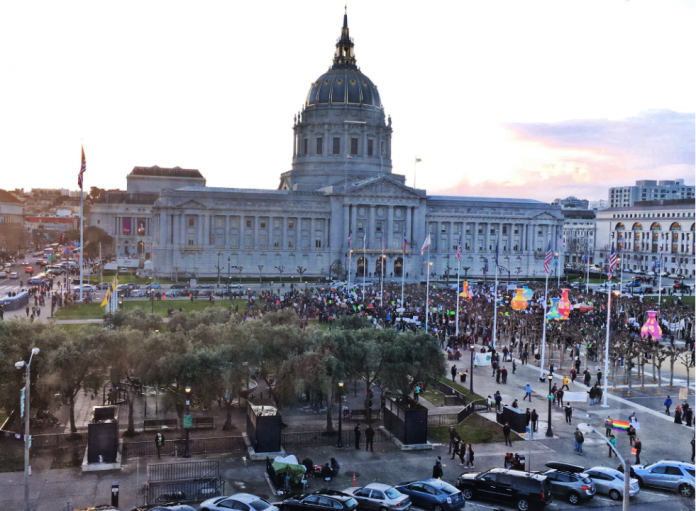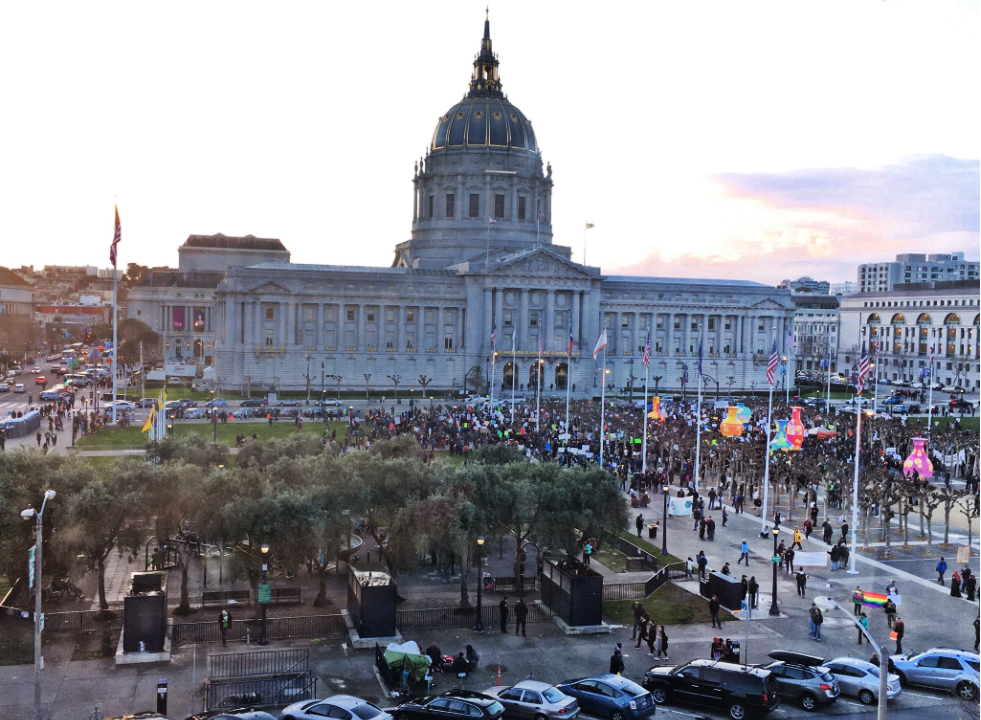
The looming train wreck that is the San Francisco budget will start to take shape this week when the supes Budget and Finance Committee gets a briefing from the Mayor’s Office Thursday/8.
The mayor has already said that the budget for next year is out of whack by as much as $119 million, and that number could grow over the next few years to more than $800 million. At last week’s Budget Committee meeting, Sup. Katy Tang suggested that the current deficit could be as much as $350 million.

The reality is that all of these numbers are guesses. We don’t know exactly how much sales tax or property tax or transfer tax will come in; that changes week to week. We do know that the mayor balanced the last budget on the assumption that his sales-tax increase would pass, and the voters rejected it, which blew an instant $150 million hole in the budget.
That kind of talk has the mayor’s budget director sounding tight with the money – Sup. Sandra Lee Fewer was unable to get even a relatively tiny amount of money for the Public Defender’s Office (her original request was less than one tenth of one percent of the city budget).
But neither the mayor nor Board of Supes President London Breed has shown any signs of major concern over the pretty clear reality that President Trump and the GOP Congress will soon cut vast sums of money that used to go to cities.
Look at any week’s agenda for the Budget Committee. On the same day that the members will hear about the next budget, they will vote to accept and spend more than $900,000 in federal grants. Check out this list of emergency service jobs that are entirely funded from federal grants. That’s just a tiny fraction of the money SF gets from the federal government every year, and given everything the GOP has said about the next budget, a fair amount of it is going to go away.
Trump, for example, has announced that he wants to cut the Environmental Protection Agency by 20 percent. We are used to news like this; EPA grants have long helped this city fund local programs. That kind of money? Gone.
When the city starts to face that reality, there will have to be some discussions of something the mayor has been mostly running away from: How do we raise revenue, a lot of new revenue, not from the poor and working class (sales taxes are regressive) but from the people who are doing well know and will do even better under the Trump tax cuts.
Help us save local journalism!
Every tax-deductible donation helps us grow to cover the issues that mean the most to our community. Become a 48 Hills Hero and support the only daily progressive news source in the Bay Area.
Otherwise we are looking at major service cuts – and they can hit fast. The Trump budget will be announced this month, and the Democrats can’t block it.
We passed the “Mansion Tax” last fall for free City College. What’s the “Trump Tax” that can preserve city services – and how to we pass it?
The state’s going to be in the same position, facing a loss in the tens of millions of dollars.
Long term, that is over the next four years, Sacramento is going to have to make some serious changes. State law puts all kinds of mandates on cities, but strictly limits our ability to solve problems. The state won’t let us extend rent controls to vacant apartments (the most powerful way to prevent displacement). The state won’t let us stop no-fault evictions.
And the state won’t let us levy progressive taxes.
Portland is able to tax companies that pay their CEOs exorbitant sums because under Oregon law, cities can tax the income of corporations. New York and Philadelphia have city income taxes, which are the best way to raise money: You set the rates right, and the rich pay the largest share – and since nearly everyone who would be hit by a progressive local income tax itemizes deductions, and local taxes are deductible, some of that money comes directly from Washington.
California won’t let cities do that.
Former state Sen. Mark Leno passed legislation that allows cities to levy their own vehicle license fees (car taxes). That’s a regressive tax, too – unless you exempt, say, the first $20,000 in value and only tax more expensive new cars.
But the state is going to have to follow that model, and allow cities more flexibility on taxes and regulations; that’s the real anti-Trump agenda.
Is the mayor willing to go to the voters and support a progressive revenue measure? Is he willing to reject service cuts and find other ways to raise cash (like increasing the transit impact fee on downtown developers)?
Or is he going to say: We have to live within our means, too bad, but service cuts are just part of the deal?
Because that’s what Trump wants. All of the things we need to do to resist him coast money. And the best way to fight him is to say that the agenda of eliminating social, environmental, and regulatory programs is wrong, that we will block it here at home – and that we are going to make the corporations and the wealthy pay.
That’s the next big front in the anti-Trump battle, and it comes down to one word: Money.


TY but it’s one reason that the left is losing a lot of ppl. Have a good day.
I don’t condone that kind of stuff.
The left is known for their authoritarianism these days: speech, violence like Berkeley, all campuses. Additionally, the left is known to be absolutely insane: Pelosi frequently calling current POTUS “Bush”.
Regarding violence, sorry but that is the realm of the left, BAMN, Black Bloc, all your side of the fence and your side is harming citizens.
Have a nice night!
The authoritarian right hates all government workers, except the ones that carry guns and kill people. If their purpose is to help, hate ’em. But if their purpose is to bust ass and hopefully shoot someone -oh yeah, now we’re talking’! Worship them, hold them up as heroes!
I agree, those salaries are high. But rightwing trolls (and politicians) always shift the debate to target working people, at a time of historical inequality. American billionaires, many of them based in the Bay Area, strip the economy by offshoring their income, despite profiting from publicly funded infrastructure, legal systems, technologies, and educated talent. Let’s please keep some perspective here!
Of course, the left’s solution is to cut the first responders. The fact that crime is going UP in SF doesn’t matter.
We could probably cut cops by about a third and no one would notice the difference, except maybe the donut shops.
Good point, but SnapsMCKenzie’s point shouldn’t be lost either. I usually disagree with him, but there are *some* salaries which are ridiculous in this city. Emphasis on the word “some.”
I’m not talking about $65,000 per year MUNI drivers -they work hard and they deserve it. But there are literally thousands of $150,000 per year cops and firefighters. They could easily get paid half of that and that would be a fair salary considering the level of training required for those jobs. And there are literally hundreds of upper level managers making multiple hundreds of thousands of dollars, many of whom are political appointees in a nepotistic cesspool of corruption. Half of them could just be fired tomorrow and no one would notice.
But yeah, the rich need to pay more, and Prop 13 needs to be repealed.
Thank you. Now please post the incomes of the tech, developer, and hedge fund titans relevant to this article.
“Working people”
Ed Lee – $363,000
Kirk Richardson – SFFD – $366,000
David Franklin – SFFD – $372,000
Antonio Santiogo – SF Sheriff – $373,000
Roland Pickens – SF Health – $375,000
Milton Estes – SF Health – $378,000
Ed Reiskin – SFMTA – $380,000
Thomas Siragusa – SFFD – $384,000
Barbara Garcia – SF Health – $385,000
Harlan Kelly Jr – SFPUC – $400,000
Yifang Qian – SF Health – $405,000
Susan Currin – SF General – $406,000
William Coker – SFERS – $634,000
Yeah, stick it to working people! Save the billionaires!
At least Tim isn’t shrieking about repealing Prop 13 in response to this news. That’s his usual response to any budget deficit on a local or state level. I’ve got a better idea though – how about asking city employees to take a voluntary 5% reduction in their salaries and pay 10% more towards their healthcare? During this tumultuous time, should everyone do their share to ensure we can continue to provide these vital services to our most vulnerable? I’ve got a very strong feeling class solidarity will quickly run aground on the shoals of economic reality for our city employees.
They would need to repeal the law which has been there since the 1960s, which prohibits cities from collecting income tax. It would be an impossible sell to republicans and a tough sell to centrist democrats. I do think that it would make more sense to have a municipal tax in rich and unequal cities than it would in a place like Alturas or Visalia.
Eliminate NAP and the Environment Department to save money. There are probably other ways to reduce City employees and save a lot of money and reduce the future pension crisis.
Just resisting Trump is a losing strategy. There must be goals that people can get behind.
There is a next step. What would it take to make Sacramento give cities more flexibility in taxing authority? I’m sure San Francisco’s not the only one in this situation.
Just as we can count on Federal money to be cut, we can cut on Lee to refuse any new taxes, and there probably won’t be a veto-proof BOS majority until things get really desperate. That means ballot propositions. It also means a lot of diplomacy to get a few tycoons on board to support such measures.
I don’t know how hard it would be to change things in Sacramento.